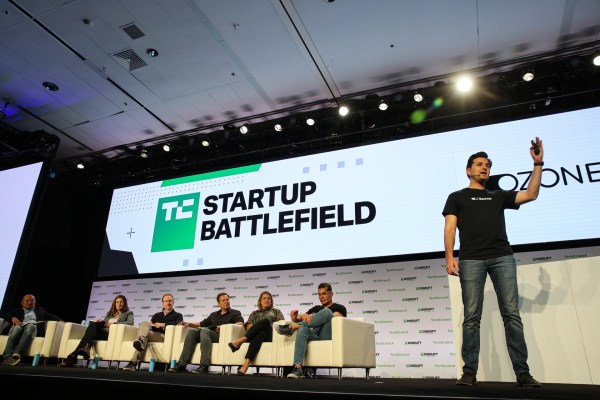Imagine this. Instead of giving away your personal data so web giants can show you ads, you cut out the middle person and allow advertisers to pay you directly for your data.
It’s a novel idea for a new startup that bills itself as a “data privacy” company.
OzoneAI says it preserves users’ privacy by allowing them more granular controls over who gets their data. In the startup’s utopian vision, companies can skip over the major advertising giants like Google and Facebook and buy access to anonymized data from the users themselves. That could mean companies buying your Spotify playlists, your Amazon wish list, or your access to your social media. The user is paid for the access, and the company gets to use the data for better targeting their ads.
The company made its public debut at Disrupt SF on the Startup Battlefield stage.
The startup seeks to capitalize on the wave in recent years of mistrust over online ads. As websites have become more aggressive in their advertising by persistently tracking users and collecting personal data, users have fought back with ad-blockers and privacy apps.
OzoneAI thinks there can be a happy medium between selling and protecting your data. With an app, users can grant companies access to their data and get paid for it. In return, companies get anonymized data which they can use for better targeting consumers.
By taking big tech out of the equation, the startup thinks it can make advertising more efficient for everyone.
But not everyone will see it that way. The privacy-minded with their ad blockers aren’t likely to lower their own bar to allow advertisers any more access to their data than is necessary. But for those who want to make a quick buck, will their actions be motivated more by making money and less about privacy?
When asked, the company’s founders Lyndon Oh and Ben Colman, who both previously worked for Google, denied it was encouraging users.
“However much activity you want to sell, that’s completely up to you,” the founders said. “You are anonymized as an identity; however, your data is not. The fact that you watched ‘The Avengers’ five times last week is not anonymized — you are selling that directly.”
Users’ data is fed into the machine learning engine to make recommendations for other companies and services, allowing the process to match activity to another business. OzoneAI makes its money by charging a 30% cut from the businesses who subscribe to a user’s data, which they say still provides better value than the “spray and pay” model that companies who want to advertise on Facebook and Google are subjected to.
The user can use the OzoneAI app to log in to their various social networks, shopping sites, email provider and anything else. That authorizes OzoneAI to vacuum up your data and begin processing it.
Unsurprisingly, many will turn their nose up at the concept of having a startup they’ve never heard of be effectively given unfettered access to all their online accounts so they can sell your data directly to companies hungry to advertise to you. The startup says it, like any company with similar access to the firehose of a person’s online life, has access to that data but immediately writes the data to its servers in an encrypted way. The user retains the private key to their cloud-stored encrypted data, so OzoneAI says it can’t access the user’s data. Through the app, the user can also “detonate” and destroy any of their collected data.
But by giving users control of their data, the user has to trust OzoneAI more than the existing advertising system. Given how broken the existing system is, it likely wouldn’t take much trust at all. But it’s an uphill battle for an emerging startup with not much of a name. And one hiccup could send that trust tanking.
The founders said other tech companies are “doing the same thing,” and that’s reason enough why users should trust OzoneAI.
But “another company does it” doesn’t mean it’s the right thing. OzoneAI was “just putting users directly in front of the business,” the founders said.
The old saying goes, “If you’re not paying, you are the product.” And yet as much as you are paying — with your data — then you inexplicably are still the product.
